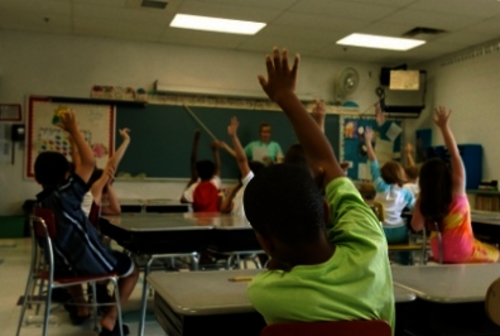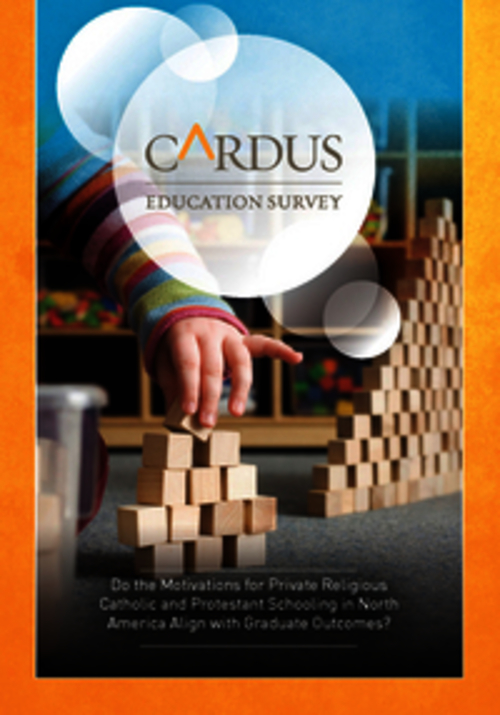
Protestant Christian School Graduates Excel in Giving, Prioritizing Family
June 16, 2011

Cardus Education Survey covered in Christian Post, “Protestant Christian School Graduates Excel in Giving, Prioritizing Family”
Graduates of Christian schools are more likely to be generous, grateful, and optimistic and less likely to divorce compared to public school graduates, according to a recent study. Read the full news story.
June 16, 2011

Malick’s Microcosm: A Review of “Tree of Life”
The old New England Primer, used to educate schoolchildren in colonial America, started much the same way as that other foundational textbook, the Bible: "In Adam's Fall, We Sinned All." The little sentence was assigned to the letter A, but it was a lot bigger than that. There's plenty about colonial America I wouldn't want to replicate, but I kind of like this stark beginning to an education. It reminds me that children can handle the tricky stuff just as well as they handle the animals on the ark and Jesus telling the little children to come to him. Good storytellers know this: Pixar, for instance, starts their films with tragedy - something they inherited from Disney - and the fairy tales of old involve princesses trapped in towers and children being fattened up by witches. Certainly children need affirmation. But kids aren't dumb. They know from a young age that they're not perfect, that the world is not perfect, and this line about the fall of man is a pretty good place to start: a longing for a lost Eden. Read the rest at Qideas.org.
June 13, 2011

Cardus June 2011 Budget Analysis: Dissent on Deck
Introduction This is Cardus' analysis of the Government of Canada's budget for the fiscal year 2011-2012, released by the Hon. James M. Flaherty, Minister of Finance on Monday, June 6, 2011. There aren't many surprises left in this federal budget, with its mirror released only a few months ago in a minority environment. The potpourri of targeted initiatives to help families (caregivers tax credit), seniors (increase to GIS), employment (targeted tax incentives), trade (significant investment in "gateway projects"), and cities ($2 billion of gas tax transfers made permanent) are intended to provide stimulus in the midst of an overall tone of caution and restraint. Throw in a few election platform commitments, most notably the scrapping of the party vote subsidy and the booking of the $2.2 billion for Quebec tax harmonization, and the story of the 2011 budget seems told. Or is it? True, the political uncertainty of its passage has been removed, and the rhetoric of stability dominates, but there is good reason to believe underneath this rhetoric the government is preparing for a coming storm in Canadian politics: one which they intend to shape and survive. The increased emphasis on expenditure review and the advanced targets for returning to surplus are just two indicators that this budget is really about battening down the hatches and rolling out the foundations for shaping tomorrow's social architecture. The New Normal The political subsidy change provides a compelling case study about how relatively small numbers can have disproportionate architectural implications. The $27 million saved on a $280 billion budget amounts to federal pocket change—but represents a fundamental change to the way political parties operate. The debate about whether this promotes corporate and union influence is a red herring; the average donation to the Conservative Party (who are hailed as being the best prepared for the new system) was less than $200 last year. What it means is that political parties will need to work to cultivate a more diffuse support base, limiting the influence of establishment elite. This is a strike at the heart of politics as usual. This change, combined with the post-election realities of 2011, means the internal politics of parties are about to get less, not more, stable. Liberal, New Democratic, Bloc, and Green parties will need to build the same kind of coalitions to fund, sustain, and project their influence into the Canadian parliament. The Conservatives, meanwhile, will have to figure out how to keep their newly empowered but divergent base united. The very different ideals which motivate poles of the Conservative support base will find ways to express themselves as expectations are disappointed. Changes to the political subsidy will change the internal pressures to which political parties respond. Ultimately, it will reshape them. And that is prompted by just $27 million. Consider what the impacts will be of coming changes with much bigger numbers. You could rhyme off a list: how will the economy and federal treasury adjust to the realities of 2.5 workers per retiree, especially considering that we are not coping overly well with the current reality of 4.7 workers? The throne speech last week announced an aggressive free trade agenda. Free trade almost always implies concentrated adjustments for particular industries. Even if the end net result is positive, there are specific sectors for which new trading realities will hurt. Foreign and international identity are live, important questions as key obligations expire. Throw into the mix the health care conundrum for which no viable answers have been tabled in the mainstream debate. The current health accord with the provinces expires in 2014, and the frame for federal-provincial controversy, not to mention voter frustration at continuing wait times for most procedures, provides political and economic fuel for the fire. These are just the known and certain challenges. Governments are often made and unmade on their response to the unexpected, like 9/11 or the economic recession of 2008. There are long-term budget implications to all of this. The government's focus on maintaining federal involvement in a wide variety of areas, including those under provincial jurisdiction, will allow for the continued use of political mechanisms, like tax credits and incentives rather than direct subsidy. The reduction in federal revenue will make for smaller government. The reduction in federal capacity will mean a deferral to other institutions, a significant change coming to our social architecture. This budget is a first step of recalibrating for a new normal in fiscal balance. Measuring Impact across Four Sectors How will this work itself out and impact the everyday life of Canadians? Start with families. The promised income splitting as well as the various tax credits (fitness, the arts, etc.) give some hints. The government will incentivize behaviours through tax programs rather than provide services with comprehensive programs. But the foundation for Canada's success is the continued growth of the for-profit sector. Infrastructure supporting trade (such as the gateways project announced in this budget) will be a high priority. Policies like the expected Perimeter Security Agreement with the United States, workforce training issues and incorporating environmental standards into energy production are complex but incremental measures. The strategy is balancing the negative fallout of incrementalism with tax rewards. Absent is a provision for the role of the not-for-profit and charitable sector. Opportunities for collaboration exist as this sector makes use of market-sensitive approaches to deliver and fund its programs, rather than government transfers. This is innovation driven by necessity, as governments increasingly rely on—and must therefore work to enlarge—the capacity of the charitable sector. What all of this sets up in the government sector is not stability but dissent. In a majority context, that debate will be more within than between parties. We've been here before. In both prior majority governments, the challenges that destroyed the party came from within. Conclusion A majority Conservative parliament holds all the cards for framing this dissent. Nestled in this budget are early hints of how they intend to shape it. But the privilege of framing the question is not always a sure recipe for building consensus around an answer. These questions are enormous, and the pragmatic whip of minority fragility is gone. What is certain is that the outcome of these questions will build a social architecture very different than today's. Don't let the rhetoric fool you: this is not a budget for today's stability, it's a prelude to tomorrow's dissent.
June 6, 2011

Canada’s coming enigma -religion and politics
With the academic year wrapping up, academics are emerging from their grading foxholes and hitting the conference trail. A little more than a week ago the annual Canadian Political Science Association met, notable for its attimes unnatural bridging of policy jocks and political nerds in one space and time. Few things unite this disparate group, other than a general topical interest and, as I found out, a near universal disregard for religion as a practical force in national politics. The first thinly attended session I sat through (two other people and myself filled the audience) was on provincial politics. Promisingly, one paper by a doctoral student at the University of British Columbia promised to show the role of religion in Albertan politics. His aim was to show that religion in Alberta should be characterized by more than social conservatism. His argument met with resistance not so much because people didn't believe religion could be more complicated, refined and subtle than the social conservatism stereotype, but because the study of religion in Canada seemed somehow quaint, cute even. There was a limited intrigue on something as arcane as religion in Canadian politics, but general disbelief and skepticism that a serious link could be drawn. Alberta, one discussant even had the temerity to suggest, was the Quebec of this generation: full of mysterious motivations, rural and religious and -not said but implied -an imported conservatism from another culture and time. Possibly American. What does it say when our political scientists better comprehend the secularist malaise of Central Canada than the robust, possibly religiously inspired, politics of Alberta? Religion in Pakistan, sure. But religion in Canada as a potent political force? Not now please, I'm eating breakfast. It offends the secular sentiments of liberal Canada to imagine that the global resurgence of religion has come home from abroad. This strikes most Americans (or really anyone outside of Europe) as bizarre. The Berkley Center for Religion, Peace & World Affairs just launched The God Vote, a collaboration between the Washington Post and Newsweek to track the role of faith in this year's American election. Even globally, Timothy Shah, Daniel Philpott and Monica Toft -three of the world's leading political scientists -have just published a book called God's Century, arguing -hold your breath -that the 21st century will not be China's, America's or even Canada's but will be the stage for a spectacular comeback of God; la revanche de Dieu as frightened French secularists call it. They write, "The view of global politics taught by political scientists is the poorest possible preparation for the era of global politics in which we now live. As we address central geopolitical challenges, we must delve into the details of religion and religious actors." So what if these arguments are right? What if the UBC doctoral student struck academic oil arguing that a religion bigger than social conservatism is having an increasingly significant effect on Alberta politics? Better yet: if the pundits are right and this past federal election was a win for Alberta, driving key western players into the halls of federal power, does that mean that religion might be even bigger than superstitious Albertan farmhands? Doesn't that mean that our political scientists have a huge hole in their analysis of Canadian politics going forward? And shouldn't that embarrass someone at the Canadian Political Science Association? It all feels eerily reminiscent of the sub-prime crisis, when experts sat dumbly at a loss to explain how the bubble burst and why. Our ivory towers are hot boxed with thinkers high off the myth of secularization, giving us answers to questions no one is asking and looking on in perplexity at the data that suggests otherwise. Only academic tenure means no one will get sacked; or -conversely -make a big bonus out of it. There's not much to be said for Marci McDonald's factually light hearted dalliance into the power of religion in Canadian politics, The Armageddon Factor. But she has this over the CPSA: at least she's noticed that something is afoot. For good or bad, religion is back and our political scientists might be the last to notice. When we trot out McDonald for deft sociological analysis, you know we've reached a bad place.
May 31, 2011

Football needs a theology of liberation
Born a few miles from Old Trafford, I am fated to be a lifelong supporter of Manchester United. Admittedly, that hasn't been an especially onerous burden in recent years and being soundly beaten by what is indisputably the best team in the world in the Uefa Champions League final on Saturday night was a lot less painful than a kick in the shins. Even in middle age, I still derive immense pleasure (albeit now from an armchair) from those uniquely elevating moments of excellence that constitute the beauty of football: the luminous, driving energy of a Lionel Messi, the tactical mastery of a Paul Scholes, the explosive precision of a Steven Gerrard, the elegant guile of a Dimitar Berbatov, the commanding athleticism of a Petr Cech. Yet the millions who delight in seeing the beautiful game performed at its very best are being systematically let down by those who profit most from its unstoppable global expansion. The legendary quip of former Liverpool manager Bill Shankly – that football isn't a matter of life and death, "it's much more important than that" – is becoming truer by the season as the game gets sucked ever more deeply into the ruthless vortex of commercial greed. I say this with no sense of schadenfreude, since Manchester United is as complicit in this corrupting descent into commodification as any other club. Others – even Buddhists – have rightly warned that footfall increasingly resembles a religion. Yet behind the more visibly cultic features of the current game – its performative public rituals, its identity-forming power and its capacity to inspire awe – lies a quasi-religious force of vastly greater power: the impersonal, hegemonic system of global financial capitalism that cares nothing for the game's distinctive excellence or the people who practice or enjoy it, and is driven by a worship of profit, power and status. The symptoms are plain for all to see: the grotesquely inflated salaries of top-level players and their infantile melodramas paraded before and egged on by a culpable and sensationalist media; the gratuitously unjust distribution of revenue from TV rights between top league clubs and the cash-strapped ones below them; the astronomical levels of indebtedness currently held by European clubs, topped by the English Premier League (EPL); the relentless takeover of EPL clubs by foreign billionaires; the damage to the families of obsessive and indebted fans; and, almost inevitably, the debilitating allegations of endemic corruption at the very highest levels of Fifa. But the results of this destruction of football's soul are also seen week by week on the pitch, as the relentless demand for success imposed by investors threatens to override a commitment to professionalism and sportsmanship: player intemperance toward referees; the deceits of diving and other forms of fakery; rapid player turnover, disrupting stylistic continuity and eroding local loyalties; overcrowded fixture lists; petty vendettas not only between players but also managers; peremptory sackings of seasoned managers at the whim of impatient and success-hungry owners; and unaffordable (and, increasingly, unsold) tickets that in effect bar low-income supporters from ever witnessing a live EPL game (tickets are much cheaper in Germany). The truly amazing thing in all of this is that for much of the time the game is still hugely rewarding to watch – the credit for which must go to the skill, dedication and level-headedness of the majority of players and managers, as well as to the amazing loyalty of supporters in spite of these almost irresistible countervailing forces. Here's a selection of the remedies needed to address the deep pathologies of the game: laying down strict rules on club indebtedness (as urged by Uefa); diverting a significant proportion of top-league TV revenues to clubs in lower tiers; securing agreement on a drastic cap on player salaries (players in their mid-twenties such as Wayne Rooney and Carlos Tevez could probably scrape by on £200,000 a year); tightening restrictions on the transfer market, both to slow the pace of transfers and to reduce the proportion of foreign players in any one club; enforcing rugby-style player respect towards referees; demanding a comprehensive overhaul of Fifa, backed by the threat of withdrawal from the next World Cup or even the creation of a rival international body from nations verifiably committed to integrity, transparency and financial moderation. The beautiful game is just that: it's not a matter of life and death. And it urgently needs to escape from the clutches of a corrupting religion of global financial capitalism. Most people probably don't know that modern football first emerged out of late 19th-century church urban mission. Many might nevertheless agree that what it now needs is a 21st-century theology of liberation.
May 31, 2011

Christian school motivations, outcomes assessed in study
May 30, 2011

OACS covers Cardus study on Christian schooling
A peek into the findings of the Cardus Education Survey (CES) was released last week, featuring the largest representative sample of Christian school graduates with the aim to discover the alignment between motivations and outcomes of Christian education. Read the entire coverage of the Cardus Education Survey here.
May 30, 2011

Protestant, Catholic graduates differ
May 29, 2011
Media Contact
Daniel Proussalidis
Director of Communications
